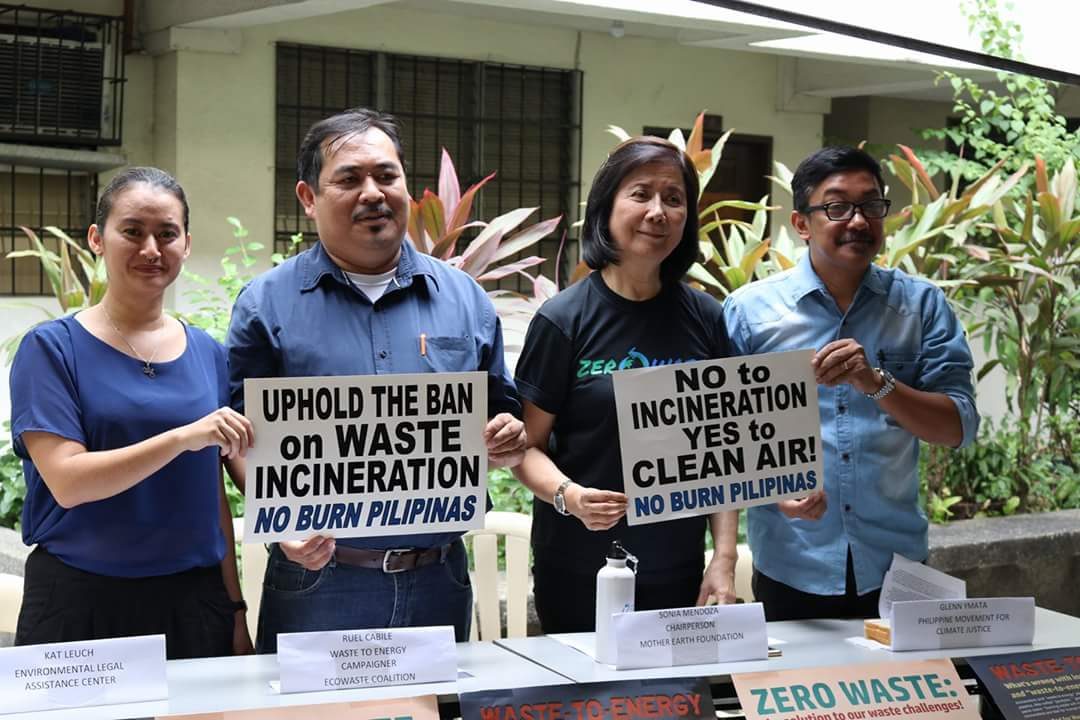SUMMARY
This is AI generated summarization, which may have errors. For context, always refer to the full article.

PUERTO PRINCESA, Palawan – A coalition of non-governmental organizations has urged the Department of Energy (DOE) and the Puerto Princesa City government to scrap the recently signed waste-to-energy (WTE) project, claiming it as illegal under the Philippine laws.
In a statement dated April 18, coalition No Burn Pilipinas (NBP) described the P2.1-billion deal with Austworks Corporation as “dubious,” claiming that the company has no track record in undertaking such a project.
The NBP added that waste incineration is banned under the Clean Air Act and contravenes the Ecological Solid Waste Management Act.
“The planned WTE incinerator in Puerto Princesa is patently illegal under the Philippine law,” said Ruel Cabili, WTE campaigner of the EcoWaste Coalition.
Earlier this month, the DOE signed the operating contract for the joint venture agreement between the city government and Austworks to put up what would be the country’s first-ever waste-to-energy plant.
Under the deal, Austworks committed to build what it calls a “thermal gasification” WTE incinerator at the City Sanitary Landfill in Barangay Sta Lourdes, as well as provide garbage collection services.
It promised to generate 5.5 megawatts from the city’s daily collection of 110 metric tons of solid and liquid waste.
But contrary to the company’s claim, the NBP said it is unlikely that Austworks will pay for the construction of its facility since it will only generate miniscule energy.
ECC violation
Coalition member Environmental Legal Assistance Center (ELAC)-Palawan Chapter noted that Puerto Princesa’s current sanitary landfill is intended to evolve into a zero waste management program, as stated in the Environmental Compliance Certificate (ECC) issued to the city government.
“The pursuit of WTE would result in the violation of the ECC,” said ELAC Palawan representative Kat Leuch.
Cabili said, “Pursuing WTE incineration undermines segregation, recycling and reduction efforts – the very approaches which the government should be supporting.”
ELAC Palawan is calling on the city government to reconsider the recently-signed incineration agreement project and prioritize instead the zero waste management in its development masterplan.
“Being a hall of fame awardee in the ‘Clean and Green Program’ of the Philippine government, we expect the city government to sustain its environmental protection efforts,” Leuch said.
‘Expensive, inefficient’
The coalition is also questioning the DOE’s promotion of WTE incineration, which is observed to be the “most expensive and inefficient way to produce electricity.”
Philippine Movement for Climate Justice’s (PMCJ) Glenn Ymata said the construction appears to cost “twice that of coal-fired power plants and 60 percent more than nuclear plants, and operations costing 10 times more than coal, and 4 times more than nuclear.”
“WTE incineration is bad for the climate and is not renewable energy; it takes investments away from real energy solutions such as wind and solar,” Ymata added.
Is it really feasible?
The NBP also doubts the success of the facility, as it claimed there are no commercially operating thermal gasification WTE incinerators anywhere in the world.
Lea Guerrero, clean energy campaigner of Global Alliance for Incinerator Alternatives, claimed, “Gasification plants are some of the most complex and expensive incinerators, and are not recommended as suitable waste treatment facilities in developing countries.”
“In fact, no commercial-scale gasification plant meant for the treatment of municipal solid waste exists anywhere in the world,” she added.
Guerrero also noted that “gasification’s history of technical challenges and failures has led to shut downs in operation which have left some cities and taxpayers in debt, paying for prohibitively expensive facilities that never worked.”
Not first in PH
The NBP has alerted cities and municipalities to be extremely wary of incinerator companies selling multi-billion-peso “quick fix” incinerators.
In fact, the coalition said the case of Puerto Princesa is not the first WTE deal that seems “too good to be true.”
In 2011, Angeles City was also lured into investing in a $63-million WTE facility that never materialized, NBP said.
In 2006, the coalition added that San Fernando City in Pampanga entered into a contract for a gasification facility that was started but never completed.
‘Support zero waste’
Shortly after its failure, San Fernando City chose instead to pursue zero waste and was able to drastically reduce the volume of municipal waste in just 6 months in partnership with NBP-member Mother Earth Foundation.
“Zero waste is still the best approach for the sustainable management of discards,” said Mother Earth Foundation chief Sonia Mendoza.
In the past, San Fernando City dumped almost 90% of its waste into landfills. With a zero waste program, which includes segregation at source and composting of organics, it was reduced to 30%, resulting in huge savings for the city in the last 4 years.
“Waste is a complex problem that can’t be solved by a machine that burns trash and merely converts solid waste to toxic air pollution. The government should support zero waste approaches instead of partnering with incinerator companies that sell false solutions to cities and municipalities,” Mendoza said. – Rappler.com
Add a comment
How does this make you feel?
There are no comments yet. Add your comment to start the conversation.